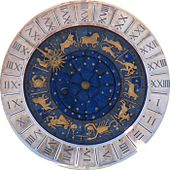 Global Information
Global InformationAstrology information
| Astrology |
|---|
 |
| Background |
|
| Traditions |
|
| Branches |
|
| Astrological signs |
|
| Symbols |
|
| Part of a series on the |
| Paranormal |
|---|
| Part of a series on |
| Esotericism |
|---|
 |
Astrology is a range of divinatory practices, recognized as pseudoscientific since the 18th century,[1][2] that propose that information about human affairs and terrestrial events may be discerned by studying the apparent positions of celestial objects.[3][4][5][6][7] Different cultures have employed forms of astrology since at least the 2nd millennium BCE, these practices having originated in calendrical systems used to predict seasonal shifts and to interpret celestial cycles as signs of divine communications.[8] Most, if not all, cultures have attached importance to what they observed in the sky, and some—such as the Hindus, Chinese, and the Maya—developed elaborate systems for predicting terrestrial events from celestial observations. Western astrology, one of the oldest astrological systems still in use, can trace its roots to 19th–17th century BCE Mesopotamia, from where it spread to Ancient Greece, Rome, the Islamic world, and eventually Central and Western Europe. Contemporary Western astrology is often associated with systems of horoscopes that purport to explain aspects of a person's personality and predict significant events in their lives based on the positions of celestial objects; the majority of professional astrologers rely on such systems.[9]
Throughout its history, astrology has had its detractors, competitors and skeptics who opposed it for moral, religious, political, and empirical reasons.[10][11][12] Nonetheless, prior to the Enlightenment, astrology was generally considered a scholarly tradition and was common in learned circles, often in close relation with astronomy, meteorology, medicine, and alchemy.[13] It was present in political circles and is mentioned in various works of literature, from Dante Alighieri and Geoffrey Chaucer to William Shakespeare, Lope de Vega, and Calderón de la Barca. During the Enlightenment, however, astrology lost its status as an area of legitimate scholarly pursuit.[14][15] Following the end of the 19th century and the wide-scale adoption of the scientific method, researchers have successfully challenged astrology on both theoretical[16][17] and experimental grounds,[18][19] and have shown it to have no scientific validity or explanatory power.[20] Astrology thus lost its academic and theoretical standing in the western world, and common belief in it largely declined, until a continuing resurgence starting in the 1960s.[21]
- ^ Hanegraaff, Wouter J. (2012). Esotericism and the Academy: Rejected Knowledge in Western Culture. Cambridge: Cambridge University Press. p. 171. ISBN 978-0-521-19621-5. Archived from the original on 26 January 2023. Retrieved 19 July 2022.
- ^ Thagard 1978, p. 229.
- ^ "astrology". Oxford Dictionary of English. Oxford University Press. Archived from the original on 19 July 2012. Retrieved 11 December 2015.
- ^ "astrology". Merriam-Webster Dictionary. Merriam-Webster Inc. Retrieved 11 December 2015.
- ^ Bunnin, Nicholas; Yu, Jiyuan (2008). The Blackwell Dictionary of Western Philosophy. John Wiley & Sons. p. 57. doi:10.1002/9780470996379. ISBN 9780470997215.
- ^ Thagard, Paul R. (1978). "Why Astrology is a Pseudoscience". Proceedings of the Biennial Meeting of the Philosophy of Science Association. 1 (1): 223–234. doi:10.1086/psaprocbienmeetp.1978.1.192639. S2CID 147050929. Archived from the original on 28 March 2019. Retrieved 14 November 2018.
- ^ Jarry, Jonathan (9 October 2020). "How Astrology Escaped the Pull of Science". Office for Science and Society. McGill University. Archived from the original on 13 August 2022. Retrieved 2 June 2022.
- ^ Koch-Westenholz, Ulla (1995). Mesopotamian astrology: an introduction to Babylonian and Assyrian celestial divination. Copenhagen: Museum Tusculanum Press. pp. Foreword, 11. ISBN 978-87-7289-287-0.
- ^ Bennett 2007, p. 83.
- ^ Cite error: The named reference
Massimo1was invoked but never defined (see the help page). - ^ Cite error: The named reference
Beanato1was invoked but never defined (see the help page). - ^ Cite error: The named reference
Hugheswas invoked but never defined (see the help page). - ^ Kassell, Lauren (5 May 2010). "Stars, spirits, signs: towards a history of astrology 1100–1800". Studies in History and Philosophy of Science Part C: Studies in History and Philosophy of Biological and Biomedical Sciences. 41 (2): 67–69. doi:10.1016/j.shpsc.2010.04.001. PMID 20513617.
- ^ Cite error: The named reference
Porterwas invoked but never defined (see the help page). - ^ Cite error: The named reference
Rutkinwas invoked but never defined (see the help page). - ^ Biswas, Mallik & Vishveshwara 1989, p. 249.
- ^ Cite error: The named reference
AsquithNSFwas invoked but never defined (see the help page). - ^ Carlson, Shawn (1985). "A double-blind test of astrology" (PDF). Nature. 318 (6045): 419–425. Bibcode:1985Natur.318..419C. doi:10.1038/318419a0. S2CID 5135208. Archived (PDF) from the original on 9 October 2022.
- ^ Zarka 2011.
- ^ Bennett 2007.
- ^ David E. Pingree; Robert Andrew Gilbert. "Astrology - Astrology in modern times". Encyclopædia Britannica. Retrieved 7 October 2012.
In countries such as India, where only a small intellectual elite has been trained in Western physics, astrology manages to retain here and there its position among the sciences. Its continued legitimacy is demonstrated by the fact that some Indian universities offer advanced degrees in astrology. In the West, however, Newtonian physics and Enlightenment rationalism largely eradicated the widespread belief in astrology, yet Western astrology is far from dead, as demonstrated by the strong popular following it gained in the 1960s.